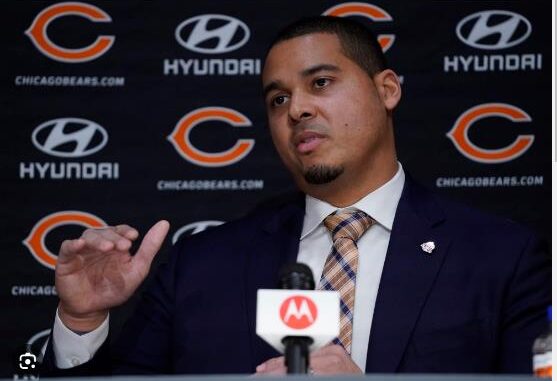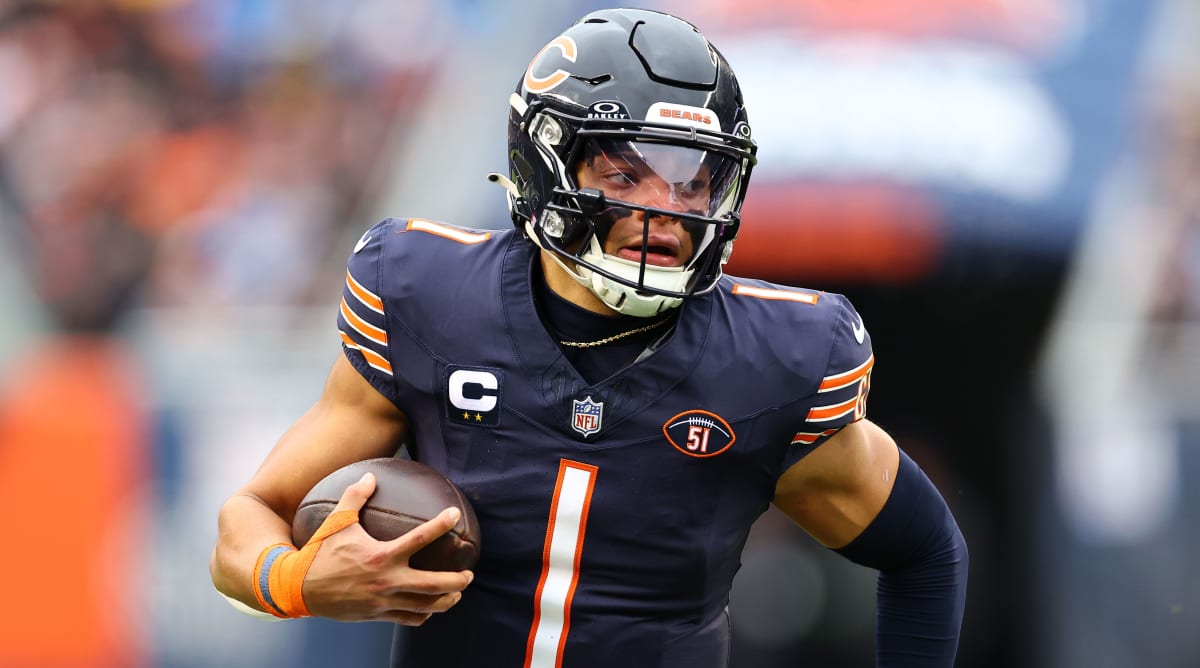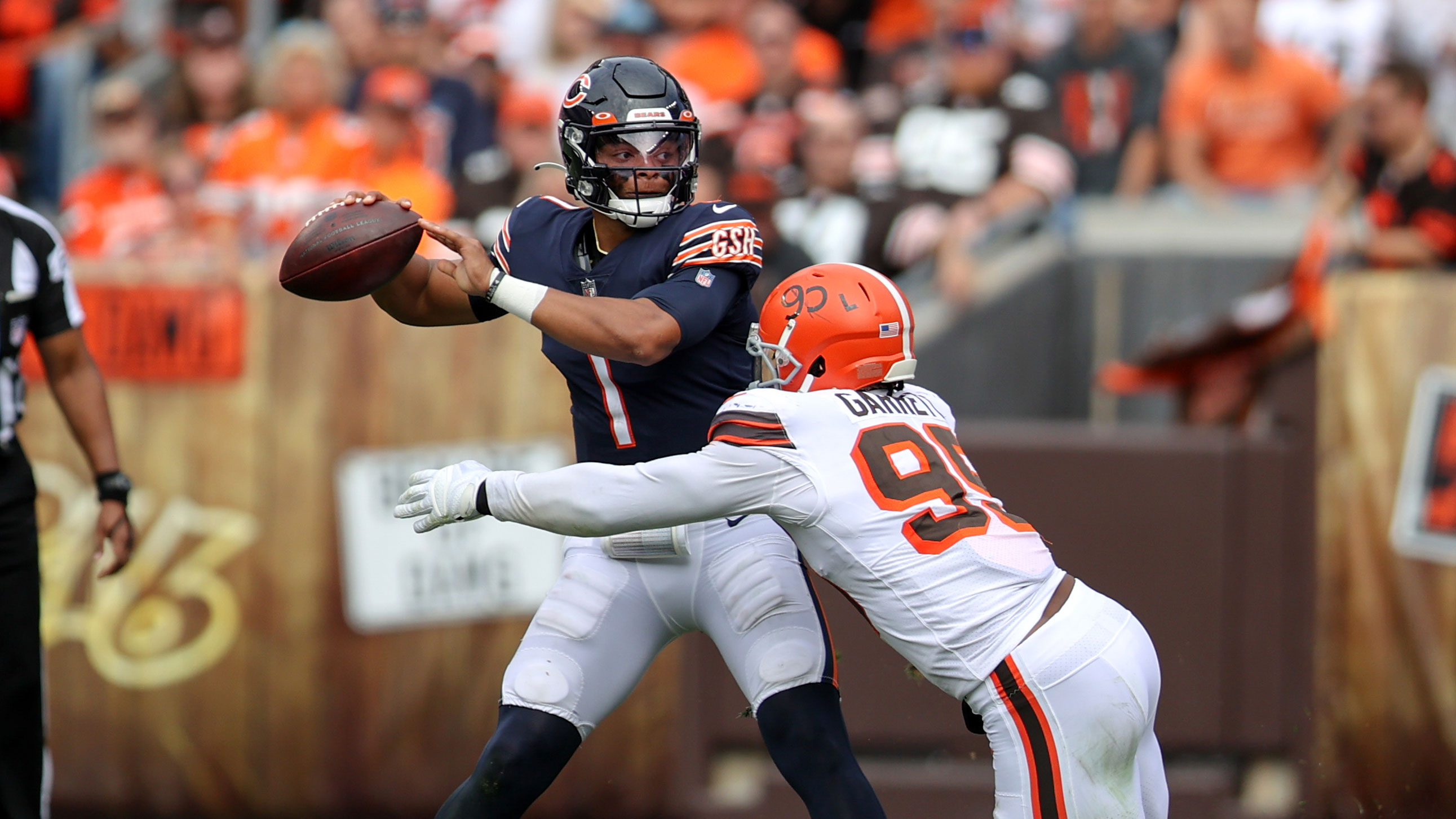
Justin Fields has put together an argument after a shaky three-game start to the NFL season.
One who claims that, despite some inconsistency, he is improving as an NFL quarterback. He’s completing fewer wide-open passes. He’s being more patient in the pocket and isn’t drifting as much. Rather than breaking out of structure to look for plays, he’s running to complement and balance his game. With 34 starts for the Chicago Bears under his belt, you can draw a line between two 17-game sample sizes — which would represent two full NFL seasons — and see that his second 17 is noticeably better than his first. And after his final four games of the 2024 season, we’ll see if the Bears believe he’s worth passing on Caleb Williams with the No. 1 overall pick.

At least seven NFL general managers are skeptical. And the general consensus is that it is not a close call.
“It would be a no-brainer for me to draft Caleb,” an AFC general manager said. “The fact that we’re in Year 3 and they don’t want to take advantage of the fifth-year option tells me everything I need to know.” Despite his physical gifts, I don’t believe Fields can win consistently as a passer.”
“[Caleb Williams] worries me, but he is definitely talented,” said an NFC general manager. “It just buys you more time and a much cheaper contract to keep adding pieces to build the team.”
“When you pass on talented quarterbacks to lean into a guy’s development, which the Bears did when they traded No. 1 last year, you have to be completely sure of that decision to do it a second time,” said a different AFC general manager. “They may not have selected C.J. Stroud with the first overall pick last year, but he was there for them to do so.” Caleb Williams is a no-brainer, and he’ll be there for them if they get the first pick. Sometimes the gamblers continue to pass on them. If Fields fails to break through, you don’t want to be the guys who passed on both Stroud and Caleb Williams.”
The general managers provided numerous reasons for trading Fields and selecting Williams: Caleb Williams’ considerable talent; his more refined passer acumen; the opportunity to reset with a rookie quarterback contract; the need to make a fifth-year option decision on Fields this spring, when it appears more data is still required… and so on.

Another NFC general manager mentioned a psychological aspect of this crossroads as well: Despite the fact that Bears GM Ryan Poles has yet to draft his own quarterback — Fields was chosen by the previous regime — Fields’ development has a direct impact on Poles’ job status.
“Nobody wants to be judged or fired because they didn’t make the previous guy’s draft picks work,” said the general manager of the NFL. “Especially quarterbacks and head coaches, if something isn’t working out or lagging, you should be given the opportunity to change it your way.” Quarterbacks and head coaches are so much a part of your culture that it’s difficult to take the hits when you didn’t put those pieces in place.”
Of course, no one knows Fields better than Poles. They are looking in from the outside at the struggle for improvement. Poles may be pleased with Fields’ progress with D.J. Moore and other weapons, seeing Fields’ fifth-year option as already viable based on this season’s progress. Poles may also be tempted to trade a No. 1 overall pick for more assets (as he did last year) in order to continue stacking talent all over the depth chart rather than concentrating it on one quarterback.
Poles will have a decision on his hands, regardless of where his head is. The Carolina Panthers, who own the Bears’ 2024 first-round pick, are now two games ahead of the New England Patriots in the draft standings. And the Panthers’ four remaining games are against teams that are currently in the hunt for a playoff spot. It’s reasonable to conclude that the Panthers aren’t going to start beating better teams and racking up enough wins to jeopardize their draft position.
That means Poles has two questions to answer if he believes Caleb Williams is a better quarterback than Fields.
What other teams could be interested in Justin Fields?
A few general managers have mentioned the Philadelphia Eagles as having an offense that would best suit Fields’ full development. And, by extension, the Indianapolis Colts, whose head coach, Shane Steichen, was in charge of the Eagles’ offense when it was designed around Jalen Hurts in 2021 and 2022. Unfortunately for Fields, both the Eagles and the Colts have locked down their young franchise quarterbacks, effectively ruling him out of those offenses.
Unless it doesn’t.
Current Eagles offensive coordinator Brian Johnson will be a hot name in the next round of head coaching interviews, thanks to his two years as Hurts’ quarterbacks coach before taking over as offensive coordinator this season after Steichen left. Johnson not only understands the Eagles’ offensive scheme, but he has arguably had the most direct, day-to-day impact on Hurts’ development since 2020. And if he is hired elsewhere, he will bring that knowledge with him to whichever franchise hires him.
That makes Johnson a candidate to be a Chicago Bears head coaching hire if Matt Eberflus is fired, or a potential Fields trade suitor if he lands with another quarterback-needy team other than the Bears this offseason. All of this is presuming that Johnson likes Fields as a player. Even if he does, other factors are likely to weigh in on connecting the two.
As one NFC general manager put it, if Johnson ends up with a quarterback-thin team that picks outside of the top 10 — where it would have to give up significant capital to move to the top of the draft for a quarterback — Fields becomes an appealing second option. What are the current franchises that fit that description? The New Orleans Saints (currently ranked 12th) and the Tampa Bay Buccaneers (currently ranked 20th). Two others who could be looking for a head coach but have a pick in the top ten? The Washington Commanders (fourth) and the Las Vegas Raiders (sixth) are the teams. You also can’t rule out the Atlanta Falcons, who are currently ranked 11th in the draft and are unlikely to fire Arthur Smith, but who also run a heavy RPO scheme that appears to overlap well with Fields’ talent.
How much would Fields be worth on the trade market right now?
This was a difficult question to ask because the season isn’t over yet, and Fields can certainly influence what the Bears and other teams believe he’s worth. He is currently in a tryout period for both his current franchise and others who may be interested in him. How he performs in the final month of the season will determine his future. And at least three of his remaining four games — against the Cleveland Browns, the Arizona Cardinals, the Atlanta Falcons, and the Green Bay Packers — should be significant in that regard.
Despite recent injuries, the Browns’ defense should still be a challenge with that quartet. The Falcons are a potential trade partner, so Fields’ performance in that game could help in negotiations. And the Packers could be vying for a playoff spot in the season’s final game, setting the stage for Fields to shine in a big-game situation on the road at Lambeau Field.
Despite the four games of uncertainty, the seven general managers all had an idea of what Fields could command in a trade at this point. There was no first-round value in any of their proposals. We’ll explain why in a moment. But first, here are seven estimates of Fields’ worth in draft compensation.
GM number one: A second- and fourth-round pick, contingent on a “good finish” to the season.
GM number two: A second-round pick, subject to a “strong finish” to the season.
GM three: A third-round pick plus a late-round pick that could be moved up one round based on performance.
GM four: one third-round draft pick in 2024, one fourth-round draft pick in 2025.
GM five: A third-round pick i>or/i> a second-round pick plus a late-round pick from the Bears for Fields.
Sixth and seventh GMs proposed the same thing: a third-round pick pending the end of the season.
Some of these proposals included conditions. As one general manager put it, “it only takes one team” to like Fields enough to give up more than others would. Another person mentioned that the value could rise or fall depending on how long the Bears keep Fields, arguing that a trade that drags all the way to the draft could reduce his value to teams that want him to start working with their staff right away. All of the general managers stated that his compensation would be adjusted slightly based on the next four games. None of them thought he was worth a first-round pick.
While the lack of a first-round pick may surprise some who see Fields as a hot commodity right now, the general reasoning for trade asset restrictions revolved around his remaining contract. Fields currently has one “cheap” year of football remaining next season, with a base salary of $1.61 million and a roster bonus of $1.61 million. Aside from that, an acquiring team would have to decide whether to exercise Fields’ fifth-year option in the spring of 2024. All of this means that a team is either trading for one cheap tryout year or a more expensive two-year window that includes the exercise of his fifth-year option.
Consider how the Arizona Cardinals dealt Josh Rosen to the Miami Dolphins after only one season. Rosen was drafted No. 10 overall by the Cardinals a year ago, but he became expendable when they selected Kyer Murray No. 1 overall the following season. Despite having three cheap years of control on his contract and another option year, the Dolphins only gave them a late second-round pick (No. 62 overall) for Rosen. Fields’ contract window would be much smaller if the Bears went to the negotiating table.

“You’re trading for one year of Fields, most likely,” an AFC general manager said, “because I don’t know if an acquiring team would exercise his option.”
An NFC general manager referred to it as a “Sam Darnold situation,” referring to the Carolina Panthers acquiring Darnold after his first three years with the New York Jets. The Panthers gave up a strong package for Darnold, including second, fourth, and sixth-round picks, and then exercised his $18.85 million fifth-year option just 25 days later. What motivated them to pick it up? The value of the assets they traded to acquire Darold required a two-year audition for a contract extension. They were already committed to Darnold after giving up the draft picks, so it only made sense to commit to him for the longer term.
A team could approach Fields in the same way, deciding that his 2023 film merited the triggering of his fifth-year option and a two-year “show me” window before being franchised or signing a long-term extension. If the Bears had to trade Fields, that would most likely be the best scenario. But it also necessitates a degree of desperation. When the Panthers acquired Darnold, they were desperate to fill the quarterback position. This had an effect on the pay.
The next four weeks are critical not only for the Bears, but also for potential trade partners. In that time, any number of teams could fall off a cliff. A variety of coaching and personnel positions could go from secure to shattered. And a plethora of quarterback questions, answers, and opportunities could be the underlying force that reshapes multiple franchises.
Clearly, some NFL executives believe Fields should be a part of it. We’ll find out if the Chicago Bears agree in the coming months.
Leave a Reply